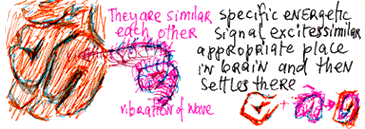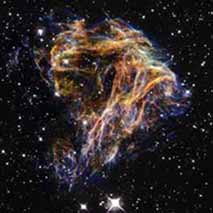Summary of Wave Theory
(Continued —
Page 19)
Printer-Friendly
Version
The Brain and Thought

The brain is comprised of one wave that consists
of two loops/swirls, which is hermetically sealed in a vessel
surrounded by liquids. In most cases, the right-hand side
is energetic and the left is magnetic. Both parts —
like everything else in nature — are connected by energetic
paths (see picture above). This aquatic environment is especially
conducive to the transmission of signals. For example, the
acoustic site in the right (energetic) side of the brain is
linked up to the acoustic part on the left (the magnetic loop),
and together they comprise a single wave.
The gyrated alignment of the brain resembles
the structure of a supernova explosion (adjacent picture).
Ascending energetic paths form a swirl before descending to
the  left
side (similar to a magnetic/gravitational wave). From there,
the path heads back to the energetic loop. Upon its arrival,
the energy proceeds to circulate throughout the wave. Due
to its abundance of sulci and gyri (folds and grooves), the
human brain is equipped to receive and process the greatest
amount of signals. All incoming signals enter the cerebellum
(smaller brain), where they are amplified before being transferred
to the cerebrum (larger brain). For example, the signals of
a musical note pass from the ear to the cerebellum. It is
simultaneously transmitted via amplification to the apposite
site at the cerebrum, as the signal can only be absorbed by
suitable loci. left
side (similar to a magnetic/gravitational wave). From there,
the path heads back to the energetic loop. Upon its arrival,
the energy proceeds to circulate throughout the wave. Due
to its abundance of sulci and gyri (folds and grooves), the
human brain is equipped to receive and process the greatest
amount of signals. All incoming signals enter the cerebellum
(smaller brain), where they are amplified before being transferred
to the cerebrum (larger brain). For example, the signals of
a musical note pass from the ear to the cerebellum. It is
simultaneously transmitted via amplification to the apposite
site at the cerebrum, as the signal can only be absorbed by
suitable loci.
Back to Top
Dr. Chaim Tejman, Copyright©
2004. All rights reserved.
[Index]
[Introduction]
[Book] [Wave
Formation] [Photons] [Gravitation]
[Time] [Life]
[Cancer] [Fundamental
Force] [Gender/Why Sex?]
[Sexual Reproduction]
[Schrodinger & Heisenberg]
[Creation] [Supernova]
[Dark Matter & Astronomy]
[Speed of Light] [Cloud
Formations] [Natural Disasters]
[Global Warming] [Thermodynamics]
[Backward Time] [Quantum
Mechanics] [Compton Effect]
[Equations] [Predictions]
[Academic Correspondences] [Contact]
[Links] [Mysteries] |